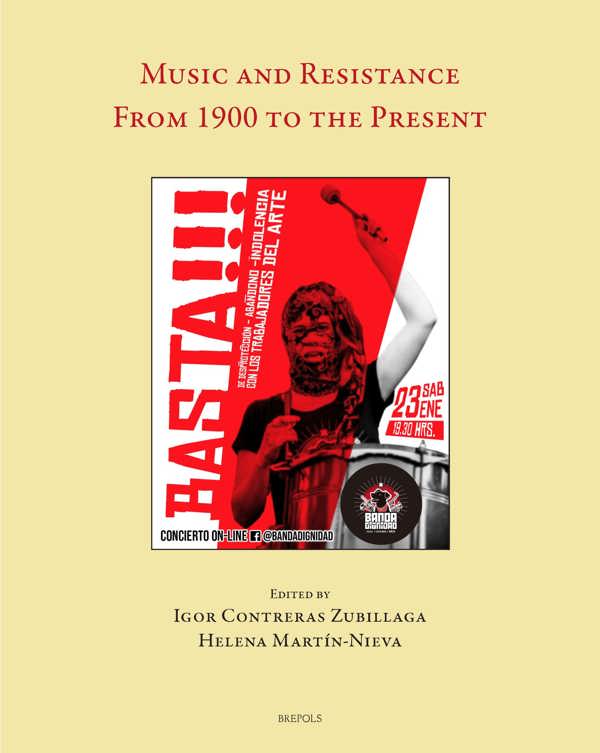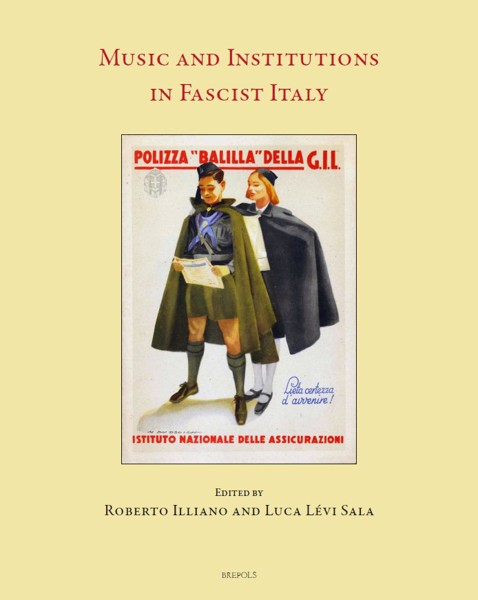
- Pages: xxi + 407 p.
- Size:220 x 280 mm
- Illustrations:30 b/w, 16 musical examples
- Language(s):English
- Publication Year:2023
- € 125,00 EXCL. VAT RETAIL PRICE
- ISBN: 978-2-503-60291-2
- Hardback
- Available
This volume analyses many types of resistance in which music has been involved from 1900 to the Present
Igor Contreras Zubillaga is Juan de la Cierva (Incorporación) Research Fellow at the Complutense University of Madrid. A specialist of the relationships between music and politics in Franco and post-Franco Spain, he is the author of «“Tant que les révolutions ressemblent à cela”. L’avant-garde musicale sous Franco» (2021).
Helena Martín-Nieva (b.1978) is an architect (2006), and musicologist (2009). She is a Lecturer at laSalle, University Ramon Llull in Barcelona. She is a researcher in the fields of history of art, architecture and music during the 20th century. She specialises in the cultural milieu of Barcelona (1939-1970) and the relationship between different art forms.
Resistance is a relevant topic today, driven by recent global social movements such as Black Lives Matter, fourth-wave feminism and the fight for recognition of LGBTIQ+ rights. In the academic arena, resistance has been the subject of increasing attention in disciplines such as sociology, anthropology, geography, political sciences and cultural and literary studies. In music, the notion of resistance has frequently been mobilised by popular music genres (hip-hop is a notable example) and, in general, in situations of political opposition. The relationship between music and resistance is, however, much richer and more complex. Through the study of specific cases from a variety of genres covering a broad period of time from 1900 to today, this volume analyses many types of resistance in which music has been involved, including various geographic and historical contexts, and also twentieth-century dictatorships and contemporary social movements. It asks how the relationship between music and resistance is established, and how music can be understood as an act of resistance. It also examines the meaning of resistance in musical terms and how we can determine if a piece of music in a certain time and space functioned as resistance to a power system.
Germán Gan Quesada & Gemma Pérez Zalduondo — Foreword
Igor Contreras Zubillaga & Helena Martín-Nieva — Music and Resistance: An Introduction
Art Music as Resistance in European Dictatorships
Erik Levi — Several Shades of Grey: Resistance amongst Composers during the Nazi Era
Franziska Kollinger — Victory through Action? Modes of Resistance and the Front National des Musiciens
Germán Gan-Quesada & Helena Martín-Nieva — Avant-garde Music, Political Commitment and Narratives of Resistance: A Perspective from Catalonia (1959-1978)
Igor Contreras Zubillaga — A Way of Resistance? The Spanish Musical Avant-garde at the 1976 Venice Biennale
Paolo Dal Molin — «A Masterpiece Inspired by the Resistance»: Arnold Schoenberg’s A Survivor from Warsaw in Post-war Italy
Confronting the Holocaust and Captivity
James A. Grymes — Spiritual and Civil Resistance in Performances of The Bartered Bride in Theresienstadt
Bret Werb — Censorship, Sabotage and Self-Subversion in the Yiddish Shoah Song
Elsa Calero-Carramolino — Musical (Re)Actions towards Captivity in Franco’s Prisons: Four Case Studies
Anna Papaeti — Resisting Oppression: The Case of Mikis Theodorakis
Identity-Based Resistance
Siel Agugliaro — Musical Resistance through Strategic Essentialism: The Case of Italian Opera in Early Twentieth-Century United States
Marged Flavia Trumper — Lord Krishna as a Symbol of Covert Resistance in a Female Vocal Genre of North India
Apostolos Poulios, Antonis Iliadis & Manolis Seiragakis — Greek Theatrical Satirical Songs as Indices of Resistance
Belén Vega Pichaco — Dancing Resistance in Cuba: Race, Sexuality and Humour in Ramiro Guerra’s Works
Sonic Agency in Social Upheavals and Beyond
Rūta Stanevičiūtė — Lithuanian Music and Resistance before the Baltic Singing Revolution
Ricardo Álvarez & Paulina Bronfman — Banda Dignidad: Carnival, Artivism and Liminality in the Chilean Social Outbreak of October 2019
Mark Le Vine & Bryan Reynolds — The Miraculous Love Kids: Grrrl Power, Rock ’n’ Roll, and Rebellion in Afghanistan
Brandon LaBelle — Acoustic Care: Communal Affection, Attention Ecologies, and Listening with
Index of Names




